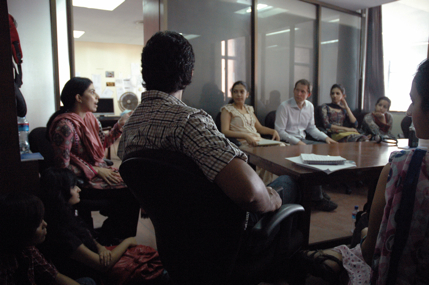|
About the Workshops
Concerning the idea of perpetual peace, Jeremy Bentham once wrote that "it is not only thought to be hopeless, but to such a degree that any proposal to that effect deserves the name of visionary and ridiculous." And yet, Bentham adds, "What better education [...] than the proposal itself?" Taking Bentham's provocation seriously, in these workshops we confronted a number of related questions concerning the idea of peace, for which there is no single answer or solution.
Can peace be defined only by the temporary cessation of hostilities, in a situation that implies the possibility of eternal war? Does the term hostility only refer to conflicts conducted by armies on behalf of nation-states, or can it also address the presence of conflicts in any area of social and political life (e.g., "religious wars," "culture wars," "the war between the sexes," "race wars," etc.) If the latter, then the 20th Century has seen the multiplication of hostilities and new social and political barriers to the idea of a permanent and lasting peace for all Humanity. Moreover, if peace only defines a relatively finite state, whether understood temporally or geopolitically, one which can only be enjoyed by relatively few at any given moment, can we accept this situation of scarcity as the answer to the question of perpetual peace? That is, is it acceptable that peace be reserved for those fortunate enough to live in a time of peace or within a peaceful province, while the rest of Humanity suffers from war and devastation?
Other Workshops

Watch videos by students from Beaconhouse National University in Lahore, Pakistan about what peace means to them.
Acknowledgements
The recordings featured on this webpage are from workshops conducted at Beaconhouse National University (BNU) and Lahore University of Management Sciences (LUMS) in September 2010 in Lahore, Pakistan. They were part of a larger series of public programs and workshops involving students, artists, architects, and social theorists that took place from September 20-26. They were led by Aaron Levy, Executive Director of Slought Foundation and a United States Cultural Envoy to Pakistan. The aim of the Lahore workshops was to explore ideas of peace and social responsibility with reference to current conditions, within the framework of cultural dialogue and institutional exchange.
The programs were organized by David Chalmers Alesworth of Beaconhouse National University and were made possible through the generous support of the Bureau of Educational and Cultural Affairs (ECA), U.S. Department of State, Washington, DC, and the United States Consulate in Lahore.
Click here for information about other workshops.
|
|
Listen to the Recordings
Multimedia Content Blocked
Beaconhouse National University
(82 min)
Multimedia Content Blocked
Lahore University of Management Sciences
(41 min)
Selected Quotations
- "I can have peace for myself as long as I see it, but if I defined peace in that way, then it would never extend beyond anyone but myself. And that for me does not give me peace."
- "You can't think of peace as a personal thing because of this concept of justice. Whichever way you choose to think of it, how can we as people live our lives on whatever level of comfort when we know that others perhaps are not?"
- "The older generation used to say that there was once peace. Even if there is peace again, it won't stay because there is no consistency in this situation."
- "Some people who go blasting are trying to put an idea in people's heads that 'we want something', but maybe they want peace in a very different manner. They're using different means to create peace."
- "I'm sorry, but when you talk about peace, I just think 'Look who's talking.'"
- "When you isolate others and you define peace within a community which excludes others that's problematic. I think we all do that on a certain level."
- "They see our [privileged] lives, and for them that's perhaps the greatest peace they can imagine. That's difficult, when you show someone something that you've achieved and then you tell them that they can't have it, or that they can't come near it. And you don't even talk to them in the same way that you talk to each other."
- "I am extremely cynical about the concept of peace. It is well and good to talk about ideas of peace, but there was a bombing right down the block from my house. Basically, I woke up, everybody asked me if I was still alive, and I went back to sleep. It doesn't really plague me every day that I need to achieve perpetual peace... The US is always going to be in this territory because they want to create instability. There is never going to be peace in this area and we have resigned to it being the way that it is."
|


